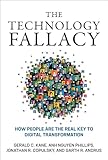The technology fallacy : how people are the real key to digital transformation / Gerald C. Kane, Anh Nguyen Phillips, Jonathan R. Copulsky, and Garth R. Andrus.
Material type: TextLanguage: English Series: Management on the cutting edge seriesPublisher: Cambridge, Massachusetts : The MIT Press, 2022Edition: First MIT Press paperback editionDescription: x, 269 pages : illustrations ; 24 cmContent type:
TextLanguage: English Series: Management on the cutting edge seriesPublisher: Cambridge, Massachusetts : The MIT Press, 2022Edition: First MIT Press paperback editionDescription: x, 269 pages : illustrations ; 24 cmContent type: - text
- unmediated
- volume
- 9780262545112 (paperback : alk. paper)
- 026254511X (paperback : alk. paper)
- 658/.05
- HD 30.2 T255 2022
| Item type | Current library | Home library | Collection | Shelving location | Call number | Copy number | Status | Date due | Barcode |
|---|---|---|---|---|---|---|---|---|---|
 Libro
Libro
|
Biblioteca Juan Bosch | Biblioteca Juan Bosch | Ciencias Sociales | Ciencias Sociales (3er. Piso) | HD 30.2 T255 2022 (Browse shelf(Opens below)) | 1 | Available | 00000174443 |
Browsing Biblioteca Juan Bosch shelves, Shelving location: Ciencias Sociales (3er. Piso), Collection: Ciencias Sociales Close shelf browser (Hides shelf browser)

|

|

|

|

|

|

|
||
| HD 30.2 S838 2000 Business dynamics / | HD 30.2 S958i 2006 Infotopia : how many minds produce knowledge / | HD 30.2 S971d 2017 Digital @ scale : how you can lead your business to the future with digital@scale / | HD 30.2 T255 2022 The technology fallacy : how people are the real key to digital transformation / | HD 30.2 T614v 2000 El valor del crecimiento para aumentar el rendimiento en las empresas / | HD 30.2 W422g 2006 Governança de TI, tecnologia da informação / | HD 30.2 W422l 1998 Leveraging the new infrastructure : how market leaders capitalize on information technology / |
Includes bibliographical references and index.
Introduction: Digital disruption
the cyclone has arrived
Part I. Navigating digital disruption: digital disruption is no secret
Digital disruption is really about people
Moving beyond the digital transformation hype
Digital strategy for an uncertain future
The duct tape approach to digital strategy
Part II. Rethinking leadership and talent for a digital age: digital leadership is not magic
What makes digital leadership different?
The digital talent mindset
Making your organization a talent magnet
The future of work
Part III. Becoming a digital organization. Cultivating a digital environment
Organizing for agility
Strength, balance, courage, and common sense: becoming intentionally collaborative
Test fast, learn fast, scale fast
Moving forward: a practical guide
Conclusion: There's no going back to Kansas
Digital technologies are disrupting organizations of every size and shape, leaving managers scrambling to find a technology fix that will help their organizations compete. This book offers managers and business leaders a guide for surviving digital disruptions--but it is not a book about technology. It is about the organizational changes required to harness the power of technology. The authors argue that digital disruption is primarily about people and that effective digital transformation involves changes to organizational dynamics and how work gets done. A focus only on selecting and implementing the right digital technologies is not likely to lead to success. The best way to respond to digital disruption is by changing the company culture to be more agile, risk tolerant, and experimental. The authors draw on four years of research, conducted in partnership with MIT Sloan Management Review and Deloitte, surveying more than 16,000 people and conducting interviews with managers at such companies as Walmart, Google, and Salesforce. They introduce the concept of digital maturity--the ability to take advantage of opportunities offered by the new technology--and address the specifics of digital transformation, including cultivating a digital environment, enabling intentional collaboration, and fostering an experimental mindset. Every organization needs to understand its "digital DNA" in order to stop "doing digital" and start "being digital." Digital disruption won't end anytime soon; the average worker will probably experience numerous waves of disruption during the course of a career. The insights offered by The Technology Fallacy will hold true through them all.


There are no comments on this title.